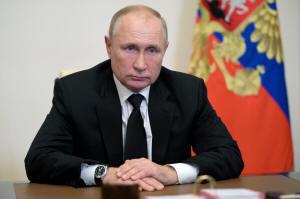'New normal': Kremlin says tough approach to Navalny allies here to stay
 Send a link to a friend
Send a link to a friend
 [September 22, 2021]
By Anton Zverev, Darya Korsunskaya and Andrew Osborn [September 22, 2021]
By Anton Zverev, Darya Korsunskaya and Andrew Osborn
MOSCOW (Reuters) - The Kremlin and its
loyalists have said they will maintain and in some cases intensify their
tough approach to internal and external critics and organisations that
they view as a threat to Russia's stability.
In the run-up to a parliamentary election won by a large margin by the
ruling United Russia against a backdrop of fraud allegations, the
authorities neutralised the party's critics outside parliament, using
legal mechanisms to stop them from taking part in the ballot and
targeting what they saw as hostile media and non-governmental
organisations.
Allies of jailed Kremlin critic Alexei Navalny, who is serving
two-and-a-half years in prison for parole violations he says are trumped
up, had their homes raided, their freedom of movement restricted, or
fled abroad after a court ruled their activities to be extremist in
June.

In comments to Reuters, the Kremlin said the authorities would continue
to take a tough line against Navalny's allies despite the election being
over. A senior lawmaker suggested a clamp-down on foreign
non-governmental organisations would ramp up.
"The non-systemic opposition (Navalny's allies) crossed a red line a
while ago. What they were doing was using provocations and all methods
to try to stir up social unrest," Kremlin spokesman Dmitry Peskov said.
"Naturally, any authorities would adopt as tough a position as possible
to that. The aim is to maintain stability in society. There is no place
for lawlessness and we are ready to force people to obey the law. This
is not connected to the Duma (parliament) elections. This is our line
and it will continue to be our line," he said.
Separately, Vasily Piskarev, head of a parliamentary committee which
investigates foreign interference, is asking the Prosecutor General to
ban the activities of more than 20 unnamed foreign non-government
organisations.

He accuses them of unlawfully urging Facebook, Twitter and Google to
ignore demands from the authorities to delete illegal content, a demand
that Google and Apple complied with.
Analysts in Russia believe the idea is to ensure maximum stability in
the run-up to the next presidential election in 2024, when Vladimir
Putin may step down as president and suggest a hand-picked successor.
"This is the new normal. They're not purging everyone before the
elections only to then relent, no," said one source close to the Kremlin
who spoke of "new rules of the game".
"All activity outside the system is now essentially extremism and we're
going to combat it. It's like in China, but we have our own path," said
the source.
[to top of second column]
|

Russian President Vladimir Putin attends a meeting with head of the
Central Election Commission Ella Pamfilova, via a video conference
call at the Novo-Ogaryovo state residence outside Moscow, Russia
September 20, 2021. Sputnik/Alexei Druzhinin/Kremlin via REUTERS

"They'll wipe out everyone (politically), get used to
it," said another source in a state corporation familiar with the
Kremlin's thinking.
Ivan Zhdanov, a Navalny ally who operates outside Russia, said the
authorities had long resorted to using illegal methods against
opponents, including the attempted murder by poisoning of Navalny in
2020.
The Kremlin denies any role in Navalny's health problems and says
the poisoning was part of a Western-backed plot to try to discredit
it.
Putin, who has been in power as president or prime minister since
1999, has not said whether he will run again in 2024, but has made
clear he wants any power transition to be smooth when the time comes
and untroubled by people he regards as Western-backed plotters.
"If the current level of repression is being driven by one specific
factor, it's probably the presidential election," the Liberal
Mission Foundation, a group of liberal-minded political analysts,
said in a report.
"It (the repression) is forever until it ends," the foundation said.

Pavel Grudinin, a Communist strawberry tycoon who came second to
Putin in the last presidential election and whose attempt to run in
the parliamentary vote was rejected by the electoral commission on
what he says were politically-motivated grounds, said the political
situation was grim.
"I think there's a prevailing view among those who take decisions
that the main thing is to create the image of an enemy, be it inside
or outside the country, and then, on that basis, destroy any
stirrings of activity," Grudinin told Reuters.
(Additional reporting by Maria Tsvetkova and Darya Korsunskaya,
Writing by Andrew Osborn and Tom Balmforth, Editing by Angus
MacSwan)
[© 2021 Thomson Reuters. All rights
reserved.] Copyright 2021 Reuters. All rights reserved. This material may not be published,
broadcast, rewritten or redistributed.
Thompson Reuters is solely responsible for this content.
 |